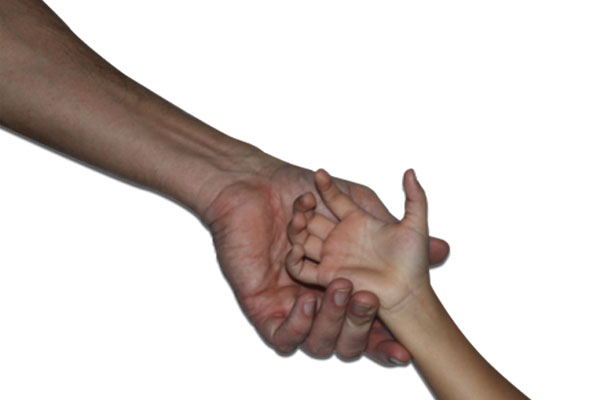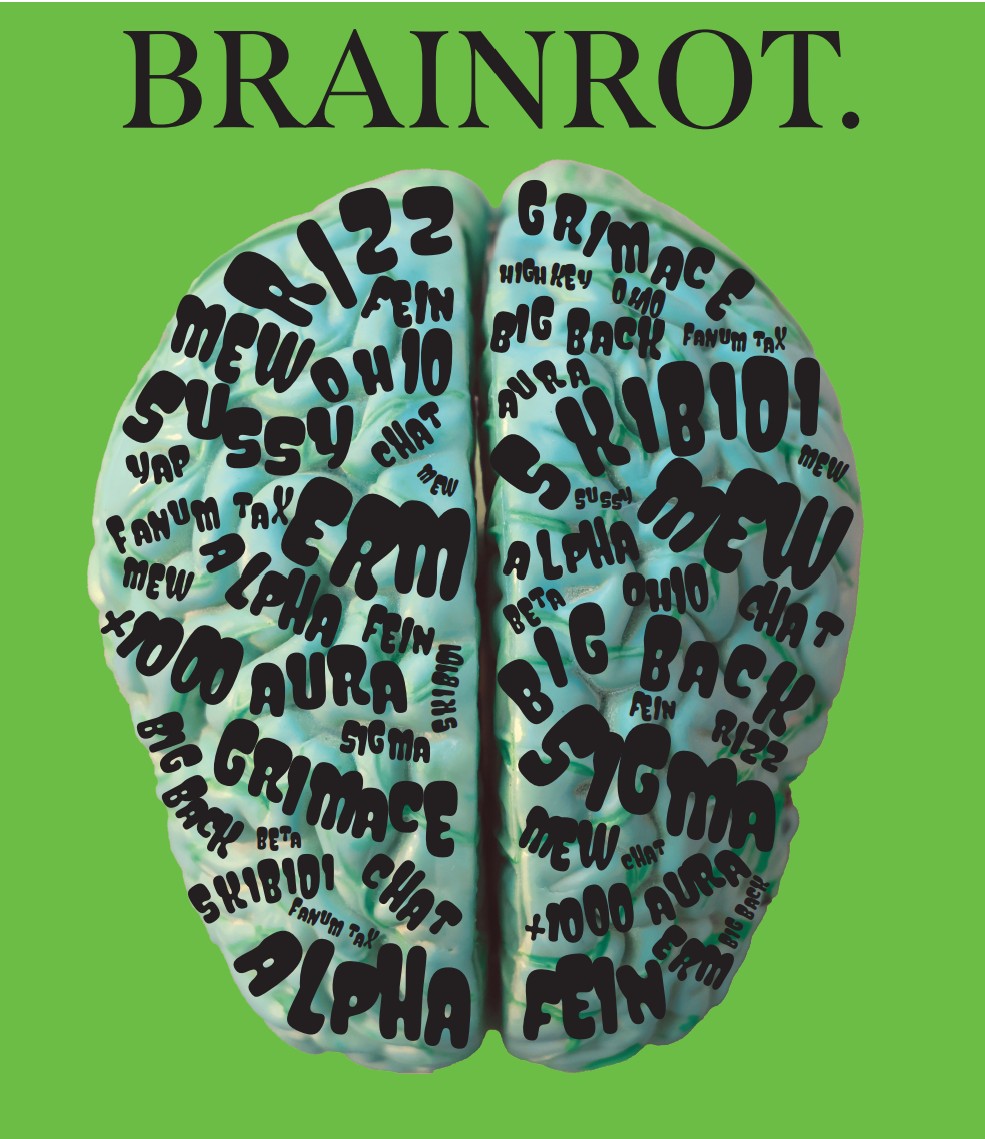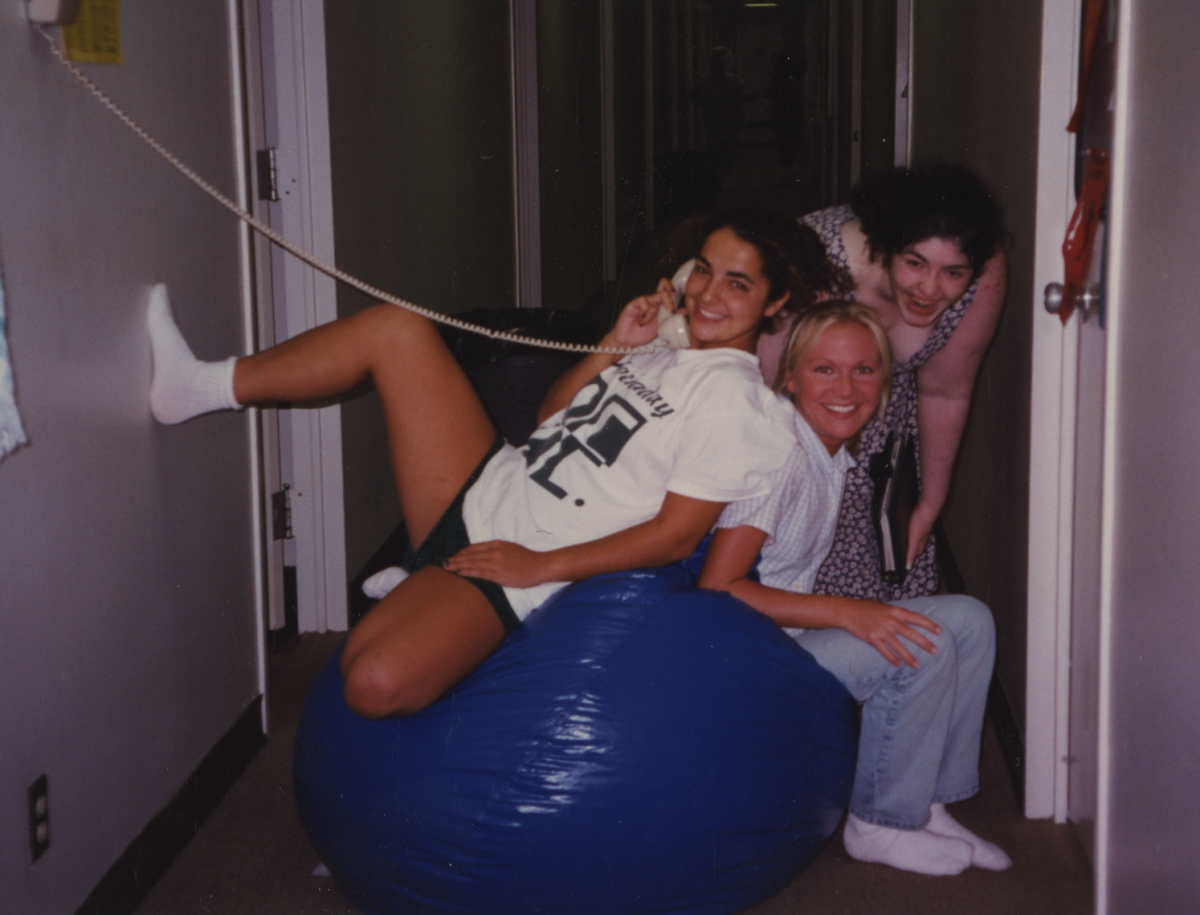The Children Left Behind
Before the age of 18, one in 20 children will experience the death of a parent. The effects are everlasting.
[img_reflect_center src=”https://hockadayfourcast.org/wp-content/uploads/2013/11/slider.jpg”]
[dropcap]Nov. 22, 1963—President John F. Kennedy was assassinated, shot en route to the Dallas Trade Mart, where he planned to give a campaign speech. Americans lost a leader that day, but two children—Caroline and John Kennedy Jr.—lost their father.[/dropcap]
According to the U.S. Census Bureau, 3,697,092 children in the U.S. lost a parent in 2012. That equates to one in 20 children under the age of 18. But each one of these children dealt with their bereavement differently. Certain factors like age, environment and manner of death will influence how a child copes with this loss. Yet despite the multitude of possibilities affecting a child’s reaction, the grief always begins with one thing: death.
Turning Point
[dropcap]Aug. 31, 2012.[/dropcap]
The 243rd day of the year. Twenty-two days before the start of fall. Eight days after school started. The day senior Megan Silver lost her father, Martin Silver.
It started as a normal dinner during a field hockey trip in St. Louis, Mo. Megan was at the restaurant Noodles and Company with her teammate, senior Lucy Wilson, and Megan’s father Martin, who wore a striped blue button-down polo, khaki shorts and white tennis shoes.
Complaining of nausea and sweating profusely, Martin asked Megan to take his order and went to sit down. After ordering, Megan returned to the table but found that Martin was gone; he had left to use the restroom. A waitress set a bowl of noodles for him down on the table.
A bowl that he would never touch.
Soon after, a waiter ran out of the bathroom and exclaimed that a man was passed out on the floor. It was Martin.
Almost 10 minutes later, the paramedics arrived, immediately rushing to the back of the restaurant, trying to resuscitate him. Megan watched from down the hallway. All she could see were his legs, stretched out the bathroom door. Still. Lifeless.
She watched as they loaded him onto a gurney 20 minutes later and rolled him into the ambulance. Though she headed to the hospital, that was the last time she saw her father.
Megan said that after his death, she experienced stages of shock, anger and sadness. Typically, there are five recognized stages of grief: denial, anger, bargaining, depression and acceptance, according to Dr. Margaret Morse, Upper School Counselor. “I couldn’t really figure out how to deal with something like [my father’s death],” Megan said. “I got into this phase where I would get angry and sad and all these emotions at once, and I didn’t really know how to deal with them.”
In the turmoil after death, children generally experience trouble in academic and social realms of their lives. Megan endured both. According to a 2012 study conducted by Judi’s House for Grieving Children and Families in Denver, Colo., an organization which offers counseling to families who have lost loved ones, 60 percent of grieving children reported having academic difficulties. “It was very difficult for me to focus,” Megan said of returning to school. “It just didn’t always seem very important, the things I was doing.”
After her father’s death, Megan found that her life didn’t feel the same. “I had trouble finding my place when I went back,” Megan said. “Everybody’s life was the same and mine was so different.”
Age Is More Than Just A Number
[dropcap]Morse was just 12 years old when her mother, Peggie King, was diagnosed with breast cancer at age 41. The cancer soon metastasized to her liver. After six years of fighting the disease, her mother passed away on Jan. 13, 1989. While Morse’s father, and even her mother, understood this death was impending, Morse refused to accept it. “I, as a 14-year-old, kept thinking that she was going to get better—that is, until the day she died,” Morse said.[/dropcap]
While she spent the last years of her mother’s life hoping her mother would overcome the sickness, her father came to terms with it and accepted the inevitability of death. In other words, her father went through a majority of the five stages of grief while her mother was still alive. Having already accepted his wife’s death for months, Morse’s father began to date again six months afterwards. This left Morse resentful and angry. “To see your parent be with someone who isn’t the other spouse is weird,” Morse said. “To me, it was a threat to my mother’s memory.”
Morse attributed her and her father’s different reactions and methods of coping to their respective ages. Even children of different ages process death differently.
Dr. Micki Burns, Director of Programs at Judi’s House, agrees that age makes a difference when it comes to understanding death. “How a Lower Schooler understands death is different than a Middle Schooler, which is different than how a High Schooler understands death.”
Age can cause different reactions towards a death even within a family, just like what happened to Morse and her father. “Everyone’s on their own different tracks,” Morse said. “[Even though they] experience the same loss, they deal with it on their own. You can still feel isolated even though you have other family members that have gone through the loss.”
Megan’s sister Mia was only 11 when her father died. While Megan does believe that her sister understands the concept of death, she does not believe that her sister is really facing the reality of what the tragedy means. “She probably processes it a little bit differently than [my mom and I] do. I think she has the perspective of, ‘He would want us to be happy, so I’m going to be happy for him,’” Megan said. “But I also think that just mentally, she chooses not to deal with it.”
Morse added that children simply think differently than adults, making them less prepared to face something as heavy as death.
According to a publication by the New York Life foundation, Dr. David Schonfeld, Director of the National Center for School Crisis and Bereavement at Cincinnati Children’s Hospital Medical Center, believes there are four basic concepts that children must comprehend in order to understand and cope with death: “death is irreversible, all life functions end completely at the time of death, everything that is alive eventually dies and there are physical reasons someone dies.”
Schonfeld explains that the concept of death is difficult for children to understand because “in cartoons, television shows and movies, children see characters ‘die’ and then come back to life. In real life, this is not going to happen,” he said.
These false portrayals of what it means to “die” hinder children from comprehending what death really means. At their age, their minds are not as developed as adults’ and they are more susceptible to believing everything they see. As Shonfeld said, “If children don’t think of the death as permanent, they have little reason to begin to mourn. An essential first step in this process is understanding and, at some level, accepting that the loss is permanent.”
Not So Suddenly
[dropcap]Sarah Simmons ‘13 awoke at 7 a.m. on Dec. 15, 2006, the day of the Hockaday Middle School Bazaar, an event where advisories sell homemade holiday goods. She wondered why her mother hadn’t woken her up. When Simmons walked out of her room, she heard voices downstairs. Her mother’s voice. Her grandmother’s voice. But not her father’s voice.[/dropcap]
Slowly, she put two and two together—her father had died.
Sarah’s father, William David Simmons, was diagnosed with Type 1 Diabetes long before she was born and had been in decline for roughly eight years. “He died in his sleep,” Sarah said. “Diabetes isn’t something you expect to kill someone, so his death was kind of sudden.”
However, because he was diagnosed with diabetes, Sarah and her mother had time to prepare themselves for his death. “It wasn’t completely unexpected,” Sarah said. “We knew that he might have a shortened life-span.”
The manner in which the loved one dies can affect the grieving process of those left behind. “When someone has an illness that they are being treated for and the end of the illness is the death, the grief process is different because you often go through the grieving as the person is still alive,” Morse said.
Like Sarah, Morse said her mother had struggled with her cancer for a while, so in some ways her father knew it was coming, and there was time for preparation. “It’s more expected and there’s more time to realize what’s about ready to happen and to tie up loose ends and to say your goodbyes,” Morse said. “You have more time to let it sink in.”
However, if the death is sudden, it can affect the person in a more negative way. “The method in which that person lost that person can have a huge impact. If it was a terminal illness, they might have time to be present to say goodbye, but if it was a sudden traumatic loss or a freak accident, there might be more emotional consequences,” Burns said.
Unlike Sarah and Morse, Megan was completely surprised by her father’s death. “I got that instant panic,” Megan said. “I couldn’t really emotionally process what was happening.”
While the shock hit Megan immediately, the true reality of death did not come for Sarah until later in her life. “Over time, I started to realize how permanent it was,” Sarah said. “I felt more of a sense of loss when I looked at all my future landmarks like graduation, my wedding [and events] that your dad is supposed to be at and realized that he wouldn’t be.”
However, Sarah said that she doesn’t “know if it would be better if [his death] was sudden or not. It’s just different.”
World Shaken
[dropcap]Accompanied by field hockey team chaperone Caroline O’Brien, Megan sat on a couch in a tiny room in the hospital. Anxious. Worried. Tense.[/dropcap]
A chaplain entered.
“I’m so sorry. Your dad just had a massive heart attack,” she said. “There was nothing we could do to save him.”
Megan could not believe it. She wondered for a moment if it was a joke. “I heard her and thought it wasn’t real. But then I realized, no, she wouldn’t joke about that,” Megan said. “I was in total shock.”
According to Morse, Megan’s initial shock was normal, but it was also partly due to the stable environment that her community provides. “In the [Hockaday] community, for the most part things are stable and secure, and we know where our next meal is coming from, and we have clothes to wear,” Morse said.
Because students are so accustomed to this stability, they are that much less prepared to deal with death. For the most part, everything in our lives is predictable; we are not accustomed to things not going the way we expect them to. On the other hand, children who are constantly surrounded by negative environments and constant violence are less inclined be as shocked by death—not that it is any less painful, it just is not as unexpected. “There are people in this stage of life who don’t have any of those things to begin with and safety and security are always in limbo,” Morse said. “When [they] lose a parent, it’s still huge, but for people within [Hockaday] where there’s a lot of stability and security, it’s even that much more traumatic.”
However, that same stability can also help someone work through the shock. The relationships girls form with other students can be essential to moving on after a loss. “My friends were as helpful as they could be,” Megan said. “I could tell that they cared about me a lot. I knew that they wanted to help, even if they didn’t always know how.”
Megan recalled the response from her fellow Hockadaisies when she asked them to buy snow cones at Doc’s Snow Cones in Dallas. In order to have Martin’s favorite flavor, natural lime with raspberry drizzle, renamed “O-Mart” after him, the shop had to sell a minimum of 200 of these snow cones in one afternoon. Hockaday rose to the challenge, purchasing approximately 350 snow cones. “O-Mart was a nickname one of our really close family friends gave him, and we thought he would appreciate having it as his Snow Cone flavor name,” Megan said. “I asked people to go support him, and a ton of people from Hockaday went. That was really nice.”
Like Megan, Sarah found that the stability at Hockaday helped her move on. “I think just the order of being at Hockaday really helped. He died the first day of holiday break, and I had two weeks of complete chaos. People were in and out of my house constantly, and it was a little too much,” Sarah said. “I was really happy in January when I had a constant schedule. My teachers helped me, and my friends treated me like it was normal.”
Morse agreed that being a part of Hockaday, being a part of any stable community, can make the grieving process much easier. “I think what’s interesting about the Hockaday community is that Hockaday is like a second family to most people,” Morse said. “I think that’s why coming back to everyday life here feels good.”
Silver Lining
[dropcap]Megan was out for a jog in the spring air last year when the scent of a nearby barbecue wafted through the air. The aroma immediately reminded of her father, who always grilled in the summertime. “It made me happy and sad to remember that,” Megan said. “There are certain ‘triggers’ that remind me of him, and a lot of the time they are really random.”[/dropcap]
Morse said that though people learn to move forward with time, the loss never does fade. “Every birthday, every holiday, every anniversary of that person’s death, you don’t relive the death every time, but that person’s death is very apparent,” Morse said. “You never forget that.”
Constantly remembering the loss of a loved one puts life into perspective. “It makes you question things and decide what is important to you,” Morse said. “Your priorities and what you think really matters get shifted.”
But the long-term effects of loss are learning that nothing is forever and that things are not always stable. “Losing someone starts existential questions: who are we, why are we here, what is the purpose of this, why did this happen? All those questions come at a very young age,” Morse said.
Megan agreed. She has become more reflective about her life, but at the same time, she has tried to focus on the positives. “I realized that nothing is permanent, [but] we have to enjoy every second that we do have,” Megan said. “[My father’s death] has already made me a lot more grateful because I understand that things can be taken away.”
By writing down memories in a journal, Megan has been able to move forward while still keeping her father in her thoughts. She writes the “little things that [she’s] worried [she] might forget as time passes.”
In addition, Megan and her family recall what Martin would have said or done in certain situations to keep him present in their everyday lives. “It’s comforting to think that, even after a year, we can still picture exactly what he would have said about one thing or another,” Megan said.
Sarah’s loss, on the other hand, inspired her to change her whole life plans. “[My father’s death] affected my career path,” Sarah said. “I’m interested in being an endocrinologist now. I want to help people with diabetes, maybe even cure it.”
Sarah has also involved herself in fundraising for the Juvenile Diabetes Research Foundation. “The fundraising just makes me feel like I’m making a difference,” Sarah said.
As far as remembering her father, Sarah stops by his grave every birthday and every anniversary of his death – what she has dubbed his “death day.” In addition, she keeps her father alive in her thoughts and the way she lives her life. “I’ve created this image of him that I’m constantly trying to please,” Sarah said. “I like to think that whatever I’m doing, he would be proud of me.”
The Phone Call
[dropcap]Saye Storey, Sarah’s grandmother, was manning the desk at Parkland Memorial Hospital in Dallas on Nov. 22, 1963. At 12:30 p.m., the phone rang.[/dropcap]
President Kennedy had been shot. Storey was instructed to help prepare the hospital for his arrival. But despite the hospital’s best efforts, Kennedy could not be saved. He left behind a lot of people that day. Family, fans, supporters, critics, colleagues. His own children.
Little did Storey know that her own granddaughter would also lose her father, 43 years later.
And the child’s life would never be the same again.
– Story and Illustration by Alexis Espinosa and Courtney Le













